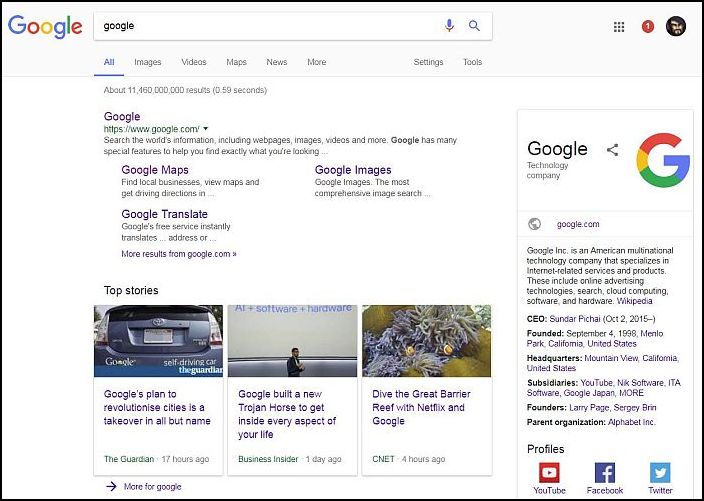Google Search most popular and big search engine on the internet. Search the world’s information, including webpages, images, videos and more. Google has many special features to help you find exactly what you’re looking for. Google Search, commonly referred to as GoogleWeb Search or simply Google, is a web search engine developed by Google. It is the most-used search engine on the World Wide Web, handling more than three billion searches each day. As of February 2016, it is the most used search engine in the US with 64.0% market share.
A basic Google search can be quick and often broadly effective, but will not always find everything you need. Effective research should use a number of search tools, to cover material not retrieved by a basic Google search. Using the advanced functions of Google, and/or specialised search engines, will get you more specific search results so you don’t have to look through irrelevant results, and may find specifically relevant information that otherwise may not be available.
Search for images on Google
You can search Google for images, just like you can search for websites. For example, you can check out pictures of potential vacation destinations, or find an image to use in an upcoming presentation.
Use “OK Google” voice searches & actions
You can use your voice to do actions like search, get directions, and create reminders. For example, say “Ok Google, do I need an umbrella tomorrow?” to see if there’s rain in the weather forecast.
Special features
Besides the main search-engine feature of searching for text, Google Search has more than 22 “special features” (activated by entering any of dozens of trigger words) when searching:
- Weather – The weather conditions, temperature, wind, humidity, and forecast, for many cities can be viewed by typing “weather” along with a city for larger cities or city and state, U.S. zip code, or city and country for smaller cities (such as: weather Lawrence, Kansas; weather Paris; weather Bremen, Germany).
- Stock quotes – The market data for a specific company or fund can be viewed by typing the ticker symbol (or include “stock”), such as: CSCO; MSFT; IBM stock; F stock (lists Ford Motor Co.); or AIVSX (fund). Results show inter-day changes, or 5-year graph, etc. This does not work for many stock names which are one letter long, such as Macy’s (M), or are common words, such as Diamond Offshore (DO) or Majesco (COOL).
- Time – The current time in many cities (worldwide)[10] can be viewed by typing “time” and the name of the city (such as: time Cairo; time Pratt, KS).
- timer – set a countdown (logging in to search the engine can be required)
- Sports scores – The scores and schedules, for sports teams, can be displayed by typing the team name or league name into the search box.
- Unit conversion – Measurements can be converted by entering each phrase, such as 10.5 cm in inches, or 90 km in miles
- Currency conversion – A money or currency converter can be selected by typing the names or currency codes(listed by ISO 4217): 6789 Euro in USD; 150 GBP in USD; 5000 Yen in USD; 5000 Yuan in lira (the U.S. dollar can be USD or “US$” or “$”, while Canadian is CAD, etc.).
- Calculator – calculation results can be determined, as it is calculated live, by entering a formula in numbers or words, such as: 6*77 +pi +sqrt(e^3)/888 plus 0.45. Search results for the formula are displayed after the calculation result. The caret “^” raises a number to an exponent power, and percentages are allowed (“40% of 300”).
- Numeric ranges – A set of numbers can be matched by using a double-dot between range numbers (70..73 or 90..100) to match any positive number in the range, inclusive. Negative numbers are treated as using exclusion-dash to not match the number.
- Dictionary lookup – A definition for a word or phrase can be found, by entering “define” followed by a colon and the word(s) to look up (such as, “define:philosophy”, maybe works for signed in users only)
- Maps – Some related maps can be displayed, by typing in the name or U.S. ZIP code of a location and the word “map” (such as: New York map; Kansas map; or Paris map).
- movie showtimes – Reviews or film showtimes can be listed for any movies playing nearby, by typing “movies” or the name of any current film into the search box. If a specific location was saved on a previous search, the top search result will display showtimes for nearby theaters for that movie.
- Public data – Trends for population (or unemployment rates) can be found for U.S. states and counties, by typing “population” or “unemployment rate” followed by a state or county name.
- Real estate and housing – Home listings in a given area can be displayed, using the trigger words “housing”, “home”, or “real estate” followed by the name of a city or U.S. zip code.
- travel data/airports – The flight status for arriving or departing U.S. flights can be displayed, by typing in the name of the airline and the flight number into the search box (such as: American airlines 18). Delays at a specific airport can also be viewed (by typing the name of the city or three-letter airport code plus word “airport”).
- package tracking – Package mail can be tracked by typing the tracking number of a Royal Mail, UPS, FedEx or USPS package directly into the search box. Results will include quick links to track the status of each shipment.
- patent numbers – U.S. patents can be searched by entering the word “patent” followed by the patent number into the search box (such as: Patent 5123123).
- area code – The geographical location (for any U.S. telephone area code) can be displayed by typing a three-digit area code (such as: 650).
- Google Goggles – using the Google Goggles app on your smartphone you can take a photograph of anything and get quick results for your search. If you wish to pursue more detailed search results you can click the “full results” tab and get a full blown Google search of the object you photographed.
- Knowledge graph – A search for things, people or places that Google knows about, such as landmarks, celebrities, cities, sports teams, buildings, geographical features, movies, celestial objects, works of art and more, and information that applies to the search term is shown in the upper right. It is rooted in public information such as Wikipedia, United States Census Bureau and the CIA World Factbook.
- Metronome – Provides a metronome with an adjustable bpm.

